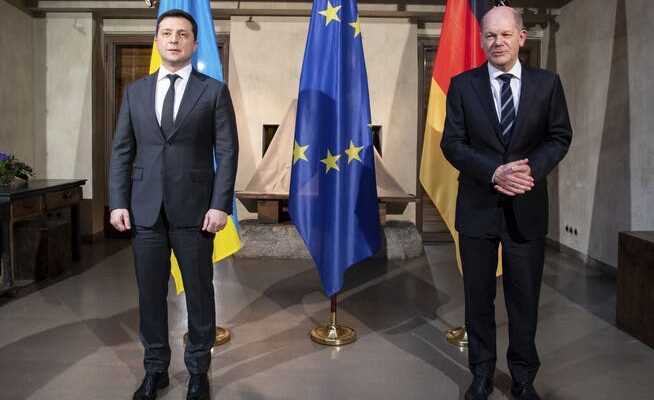The Ukrainian President addressed the participants of the Munich Security Conference with a dramatic appeal. The contrast to the thoughtful speech by German Chancellor Olaf Scholz could hardly have been greater.
Ukrainian President Volodymyr Zelensky (left) and German Chancellor Olaf Scholz in Munich on Saturday.
On the second day of this year’s Munich Security Conference, the heavyweights appeared among the guests: American Vice President Kamala Harris, German Chancellor Olaf Scholz and British Prime Minister Boris Johnson. However, the Ukrainian President Volodymyr Zelensky received the most attention.
His listeners received him with warm applause on Saturday afternoon, but he didn’t spare them: 15 years ago, Russian President Vladimir Putin challenged Europeans and Americans at the Munich Security Conference, said Selenski. They would have reacted by trying to appease. He welcomes the West’s support for Ukraine, but he doesn’t have to bow out of gratitude. Rather, his country is the shield of Europe.
«As much diplomacy as possible without being naive»
Zelensky rejected ideas that Ukraine could function as a permanent buffer state between Russia and the West. Anyone wanting this would have to think about which country would threaten Russia next. Now the EU and NATO should finally give Ukraine open answers: “If no one wants to see us there: be honest!” Zelensky called out to his audience.
The contrast between the Ukrainian President’s dramatic appeal and the thoughtful speech the German Chancellor had delivered a few hours earlier could hardly have been greater. The Russian deployment was not justified by anything, said Olaf Scholz on Saturday morning. Moscow has declared NATO membership for Ukraine to be a casus belli, but a decision on such a thing is not pending.
Now it needs “as much diplomacy as possible without being naive”. The Normandy format, in which Ukraine, Russia, Germany and France are represented, remains crucial for a solution. However, quick successes are not to be expected.
The Chancellor did not address the fact that Germany was not supplying Ukraine with weapons in his speech, but Wolfgang Ischinger, head of the security conference, did address the issue in the question and answer session that followed. Ischinger asked how Scholz would see the German attitude in retrospect if there was a Russian invasion. The Chancellor referred to Germany’s strict export regulations, which made arms deliveries to Ukraine impossible. But other Western countries would have delivered. In addition, Germany is fulfilling its obligations within the framework of NATO, for example through the presence of the Bundeswehr in the Baltic States.
The aim was to demonstrate Western unity
Unlike German Foreign Minister Annalena Baerbock the day before, Scholz made no mention of the controversial Nord Stream 2 pipeline, and Kamala Harris, who spoke after him, did him the favor of not doing so either. It was important to demonstrate Western unity, and so the American Vice President also left unmentioned German military spending, which is still well below what Berlin’s allies expect of the Federal Republic.
Instead, Harris emphasized what unites them: NATO is the backbone of the European order and Washington feels committed to Article 5 of the NATO Charter, which stipulates that the members of the alliance support each other in the event of an attack. With her commitment to the transatlantic alliance, Harris continued the speech that American President Joe Biden had given a year earlier – and underlined once again that the times of Donald Trump, who had questioned the benefits of NATO for the USA, at least for the time being are over. Harris’ listeners thanked her with prolonged applause.
